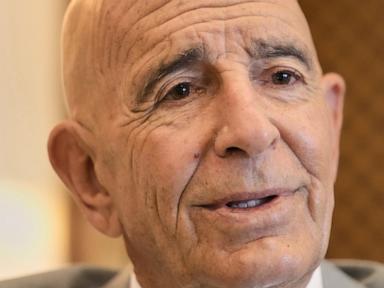U.S. Envoy Reaffirms Support for Syria’s Government Amid Regional Tensions

In a recent statement, U.S. envoy Tom Barrack reaffirmed Washington’s commitment to support the Syrian government, emphasizing that there is “no Plan B” in working with current authorities to unify a country grappling with nearly 14 years of civil war and a resurgence of sectarian violence. Speaking during an exclusive interview with The Associated Press in Beirut, Barrack criticized Israel’s recent military actions in Syria, suggesting they complicate stabilization efforts in the already volatile region.
Barrack, who serves as the U.S. ambassador to Turkey and special envoy for Syria, made his remarks following a week of violent clashes in the southern province of Sweida. The fighting involved militias from the Druze religious minority and local Sunni Muslim Bedouin tribes. Syrian government forces intervened, initially aiming to restore order but ultimately siding with the Bedouins before withdrawing under a ceasefire agreement with Druze factions. The violence has resulted in hundreds of deaths, with reports of government fighters allegedly killing Druze civilians and destroying their homes.
During this period of unrest, Israel intervened on behalf of the Druze, who are recognized as a loyal minority often serving in the Israeli military. Israeli forces conducted multiple strikes on Syrian government convoys in Sweida and targeted the Syrian Ministry of Defense headquarters in central Damascus. Over the weekend, Barrack announced a ceasefire between Syria and Israel, although he provided few details regarding the agreement.
The Syrian government has since redeployed forces in Sweida to prevent further clashes, and civilians from both sides were slated for evacuation. Barrack expressed deep concern over the violence, calling the killings and retaliatory actions “intolerable.” He remarked that the Syrian authorities have handled a complex situation as best they can, given their limited resources.
At a press conference, Barrack acknowledged the need for accountability regarding violations committed by the Syrian government. He clarified that the United States was neither consulted nor involved in Israel’s military decisions, stating, “Israel’s intervention creates another very confusing chapter and came at a very bad time.”
Prior to the unrest in Sweida, Israel and Syria had been engaged in discussions concerning security matters, with the previous administration under Donald Trump advocating for a normalization of diplomatic relations. Barrack noted that Israel viewed the area south of Damascus as a contentious zone, requiring agreement on military actions within it. The new Syrian government, however, did not share this perspective.
The ceasefire announced on Saturday addresses only the immediate conflict in Sweida and does not resolve broader issues between Syria and Israel, including Israel’s insistence on a demilitarized zone in the area. Barrack mentioned that both sides made efforts to address specific questions regarding the movement of Syrian forces during ceasefire discussions.
On the broader geopolitical landscape, Barrack pointed out that Israel might prefer a fragmented Syria, as strong nation-states, particularly Arab ones, are considered a threat. Despite this, he expressed hope that minority communities in Syria would recognize the benefits of unity.
The ongoing violence in Sweida has intensified distrust among minority religious and ethnic groups towards the new government in Damascus, formed by former insurgents who ousted long-time leader Bashar Assad. Following recent attacks on Druze civilians, many feel that the government’s assurances to protect minorities have not been met. Meanwhile, Damascus is negotiating with Kurdish forces controlling much of northeastern Syria to integrate the U.S.-backed Syrian Democratic Forces into the national army. Barrack indicated that he does not foresee the recent violence derailing these negotiations, suggesting a possible breakthrough in the coming weeks.
In a related development, Turkey has expressed interest in providing defense assistance to Syria, amid its own security concerns regarding Kurdish influence along its border. Barrack stated that the U.S. has “no position” on a potential defense pact between Syria and Turkey, emphasizing that it is not America’s role to dictate the actions of neighboring countries.
Barrack’s visit to Lebanon coincided with increasing pressure on the militant group Hezbollah to disarm following a difficult war with Israel. During a press conference in Beirut, Barrack remarked that the ceasefire agreement from November did not effectively resolve the situation, as Israel continues to conduct airstrikes aimed at preventing Hezbollah from rebuilding its military capabilities. Hezbollah has maintained that it will not discuss disarmament until Israel halts its strikes and withdraws from southern Lebanon. Barrack characterized the issue of Hezbollah’s arms as an internal matter for Lebanon, reiterating that the U.S. cannot compel Israel to alter its military strategy regarding the ceasefire.






